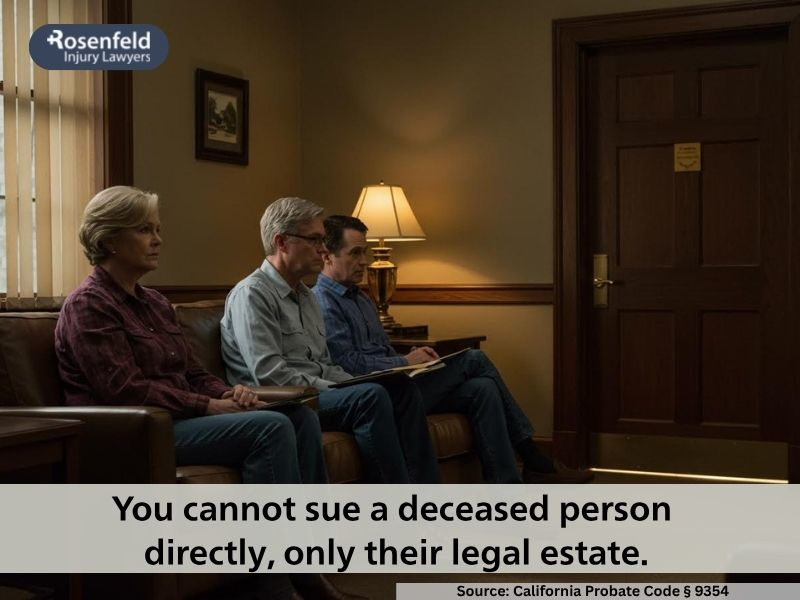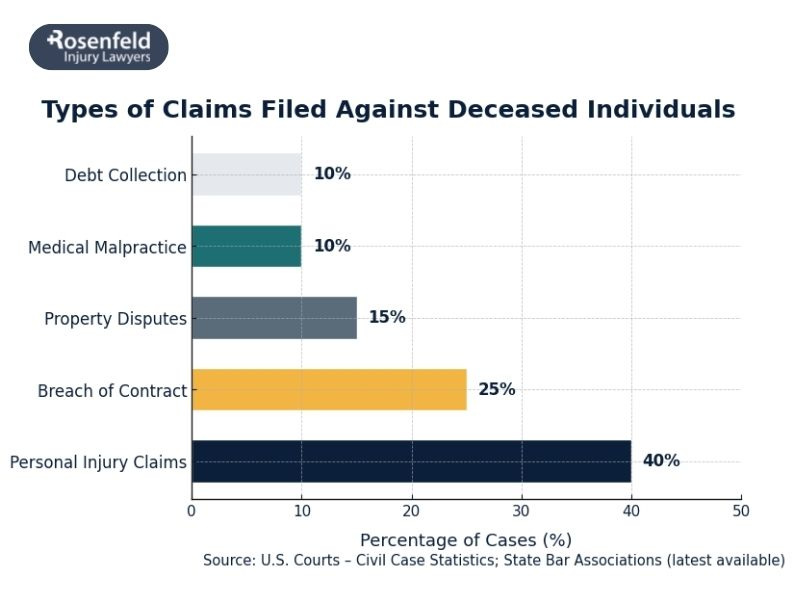Can You Sue a Dead Person?
Many people are unsure what happens if the person who caused their injury passes away before they can file a lawsuit. It’s a difficult and confusing situation, but can you sue a dead person?
In most circumstances, the short answer is yes. A person’s death doesn’t automatically erase their civil liability. Instead, the personal injury claim is typically filed against the deceased person’s estate in probate court. This process ensures that the victim still has a legal right to seek compensation from any available estate assets or insurance coverage.
While suing a deceased person can be more complex and time-consuming than a typical injury lawsuit, our experienced attorneys can guide you through each step, protect your rights, and help you pursue justice even after the negligent party’s death.

What Happens If a Defendant Dies During a Personal Injury Lawsuit?
When a defendant dies during an ongoing personal injury claim, the case does not automatically end. Civil liability continues after a person’s death, which means that if the defendant was responsible for your injuries, the lawsuit can usually proceed.
Instead of suing the individual directly, your attorney will file the personal injury claim against their estate in court.
The estate representative, sometimes called the personal representative or executor, takes the place of the deceased person in the lawsuit. The probate court has jurisdiction over these matters and ensures that any valid creditor’s claim or plaintiff’s claim is handled through the assets of the estate.
Will I Receive Notice If Someone Dies While I’m Preparing to Sue Them?
In most situations, you will not automatically receive notice of the defendant’s passing. Unless a probate case has been opened and you are formally listed as a creditor, the court or family are not required to inform you.
This can make it difficult for injury victims who are preparing to file suit. That is why it is so important to act quickly, investigate the defendant’s status, and consult an attorney who can check court records to determine whether an estate has been opened.
What If the Person Who Hurt Me Died Before I Could File?
If the negligent party dies before you have the chance to sue, you may still be able to file a lawsuit against the deceased person’s estate.
Most states allow personal injury claims to be brought against a deceased person’s estate through probate court. However, strict limitations periods apply. Some states give injury victims only a few months to file a creditor’s claim against a probate estate, sometimes as short as six months after the person’s passing.
These shortened deadlines make it critical to contact an injury attorney as soon as possible. The statute of limitations still applies, and in some cases, the timing rules for claims involving a deceased person can differ from standard personal injury lawsuits.
This is especially true in complex areas such as sexual abuse lawsuits, where the statute of limitations and discovery rules may vary significantly by state.
Can Wrongful Death Claims Be Filed After the Defendant’s Death?
In some situations, a plaintiff’s injury case may overlap with wrongful death lawsuits or other civil actions arising from the decedent’s death. When this occurs, the deceased defendant’s heirs or estate representative handle the defense of the lawsuit through the probate process.
Courts generally view the resolution of these claims as being in the best interest of all parties, including creditors and family members. However, timing remains critical. A late claim filed after the limitations period expires may be rejected by the court, even if the underlying injury was severe.
Consulting a personal injury lawyer early ensures that all matters are filed properly and within the allowed timeframe.
How to File a Lawsuit Against a Deceased Person’s Estate
Filing an injury claim after a defendant’s passing follows a different legal process than a typical claim. When a person dies, their estate becomes the legal entity responsible for handling any debts or lawsuits. This process happens through probate court, where a personal representative manages the deceased person’s affairs.
Below, we have outlined how the process generally works.
Book a Free Consultation With a Personal Injury Attorney
Before taking any legal action, it is best to speak with an injury attorney who understands probate law as well as estate litigation.
Your lawyer can review the facts of your case, locate the deceased defendant’s estate, and ensure your claim is filed within the correct limitations period. A free, confidential consultation allows you to learn about your legal options and the best strategy for pursuing compensation through the probate system.
Identifying Whether the Dead Person’s Estate Is Open in Probate
The first step is to determine whether a probate case has already been opened. Probate court records show whether an estate exists and who has been appointed as the personal representative or executor.
If no probate estate has been opened, your attorney may request that the court open one on your behalf so that your injury claim can proceed.
Filing a Formal Claim
Once the estate is open, your attorney will file a formal creditor’s claim or lawsuit against the deceased person’s estate. This claim must usually be submitted within a limited time frame set by state law.
The court then reviews the plaintiff’s claim to determine whether it falls within the court’s jurisdiction and whether the estate has enough assets to satisfy potential judgments.
Probate Court Appoints Legal Representative
When a person passes away, the probate court appoints a legal representative, known as an executor or administrator, to manage the decedent’s estate.
This person is responsible for notifying creditors, identifying bank accounts and property, and determining what assets are available. The estate representative also handles lawsuits filed against the defendant’s estate and may negotiate or defend claims.
The court ultimately decides whether to approve or deny creditor and injury-related claims based on the evidence presented. If the claim is approved, payment will come from the estate’s money, insurance coverage, or any non-probate assets available under law.
What If the Deceased Defendant’s Estate Has No Assets?
A small or insolvent probate estate does not always end your legal claim. Even if the defendant’s estate has limited funds, you may still be able to seek compensation through other sources.
Insurance Coverage May Still Apply
Auto and homeowners policies often cover an injury claim even after a person’s death. Your attorney can tender the claim directly to the insurer, review policy limits, and pursue payment without relying on the estate’s resources.
A Third Party May Share Liability
In rare situations, an employer, business, or institution that contributed to the harm can be held responsible. If the negligent party was acting within the scope of employment, the company may be liable. Identifying additional defendants can protect a plaintiff’s claim when the deceased’s estate cannot pay.
New Assets Can Reopen the Estate
Sometimes, family members discover bank accounts, real property, or other assets after the probate case closes. If that happens, the court can reopen the probate estate so valid claims can be addressed.
A Lawyer Can Help You Exhaust All Options
A personal injury attorney can investigate liability coverage, search probate court records, track down all assets, and evaluate potential claims against third parties. If the facts support legal action, we can file suit on your behalf, protect your legal right to compensation, and guide you through the probate court’s jurisdiction and procedures.

How Injury Lawyer Team Can Help
At Injury Lawyer Team, we understand that pursuing a personal injury claim after a defendant’s death can feel confusing and overwhelming. Our attorneys have extensive experience handling claims through probate court and navigating the complexities of suing a deceased person’s estate.
Our services include:
- Investigating if and when the deceased person’s estate has been opened in probate
- Locating the estate representative or personal representative
- Filing and managing creditor’s claims or lawsuits within the state’s statute of limitations
- Reviewing liability coverage and identifying all potential sources of compensation
- Working with probate court to ensure your claim is properly considered
We handle every case on a contingency fee basis, which means you pay no upfront costs and no legal fees unless we successfully recover compensation on your behalf. Every case begins with a free consultation, where we explain your legal options and help you decide the best path forward.
If you were injured and later learned that the negligent party has passed away, contact Injury Lawyer Team today. We will help you file suit, protect your rights, and pursue compensation through all available legal channels.
All content undergoes thorough legal review by experienced attorneys, including Jonathan Rosenfeld. With 25 years of experience in personal injury law and over 100 years of combined legal expertise within our team, we ensure that every article is legally accurate, compliant, and reflects current legal standards.








